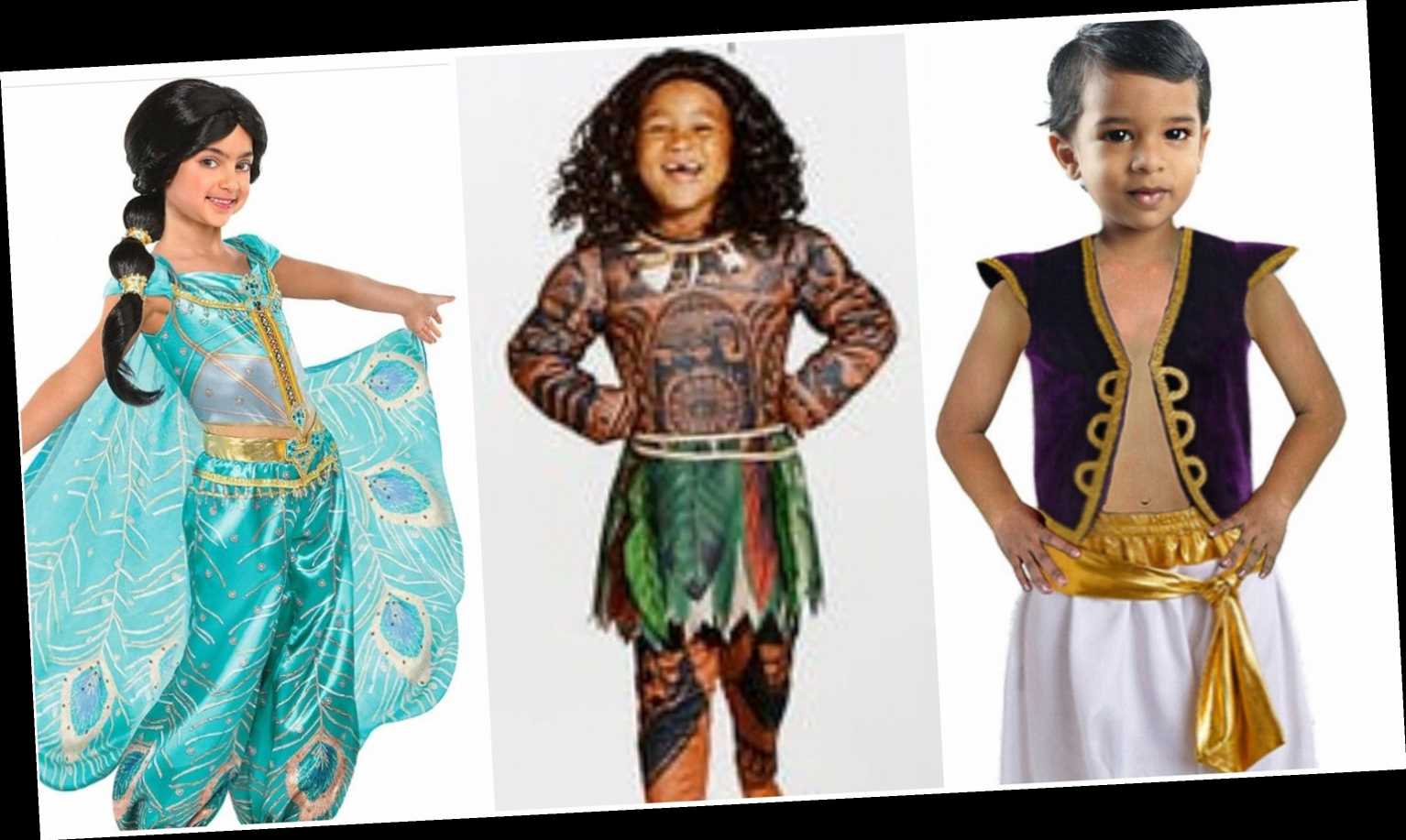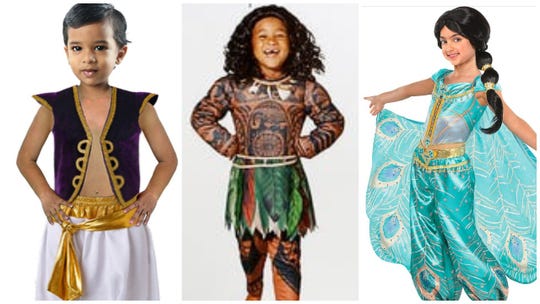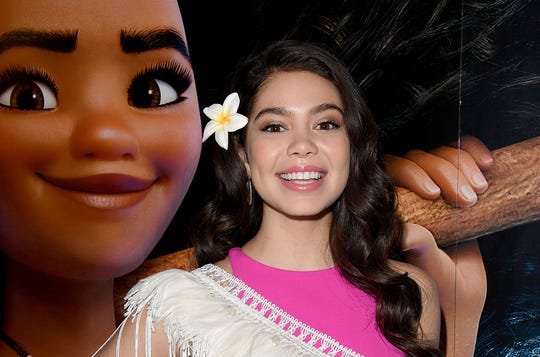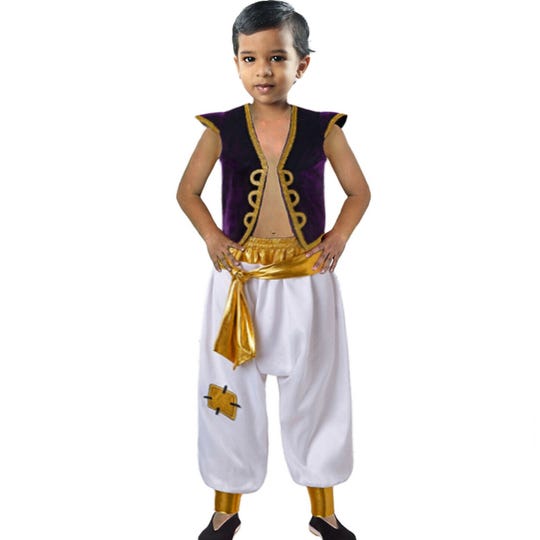No parent wants their child called out on Halloween for being culturally offensive.
Google tells us many search to learn whether the costume their child wants to wear might be racist or insensitive. Many of us moms and dads grew up wearing Native American head dresses and Geisha garb and didn’t hear boo about it. Sadly.
Now, headlines scream about whether it’s OK to go door to door dressed as Moana or Aladdin. Well, is it?
We turned to Neal Lester, Arizona State University Project Humanities director, who has led countless discussions on cultural appropriation to answer that.
Cultural appropriation, simply put, is “taking elements of someone else’s culture without permission,” Susan Scafidi, author of “Who Owns Culture: Appropriation and Authenticity in American Law,” previously told USA TODAY.
Use that bump as an accessory: 8 adorable and funny ways to dress up your pregnant bump for Halloween
A dose of pure joy: These cute Halloween pet costumes are everything we need right now!
Halloween is a land mine of cultural appropriation examples for parents because, Lester said, “it’s easy to see Disney characters and cartoon character animations and imagine those costumes are safe.”
They can be. But recent years tell us they aren’t always.
Halloween can be a tricky time for parents as they figure out what costumes are OK and what costumes will cause offense to someone else's culture. (Photo: Spirit Halloween/AP/Party City)
Recent examples of cultural appropriation
Moana costumes have been fiercely debated since the movie’s 2016 debut. Some Polynesian and non-Polynesian groups took issue with dressing up as the female lead.
Auli’i Cravalho, the Hawaii-born actress who voiced the title character, said last year that she had no problem with fans of all ethnicities dressing as her character for Halloween.
Auli'i Cravalho, the actress who voiced Moana in the hit Disney film, said it's OK for people to dress up as her character for Halloween. (Photo: Stuart C. Wilson, Getty Images for Disney)
However, Disney pulled its Maui costume two years earlier that featured a long-sleeved brown shirt with tattoos like those worn by Polynesian chiefs. The costume received international condemnation.
The costume’s trouble is with the change of skin color and its markings, Lester said. People didn’t understand the culture that those tattoos represent and “you’re literally wearing someone else’s identity.”
Over the years, other Halloween children’s costumes were also recognized as either racist or insensitive including a prisoner, a hobo, a ninja, Day of the Dead representations, a Native American and Pocahontas.
And with movies like “Black Panther” and “Coco” leading to more culturally diverse costumes, some parents fear wearing the costumes. Other parents are wondering whether it’s OK for their kids to wear them.
“I would say this isn’t a universal question some parents are asking, this is a question that white parents are asking,” Lester said.
Cultural appropriation Q&A: Is it OK for a white kid to dress up as Moana for Halloween?
Details matter in popular kids’ costumes
Let’s get down to it. Lester doesn’t like lists, but if your Halloween costume includes any one of these popular Disney princesses or characters, he offers what mostly amounts to common sense.
This Aladdin-like costume sold Spirit Halloween has some parents wondering, is this OK for my child? (Photo: Spirit Halloween)
Parents should be careful with these costumes:
- Aladdin, the street urchin turned prince thanks to a genie and Disney movie of the same name.
- Princess Jasmine, independent and determined to marry someone she loves in Disney’s “Aladdin.”
- Princess Tiana, the determined waitress who kisses a frog who becomes a prince again and turns her into a princess.
- Mulan, who disguises herself as a male to fight in an army and protect her sick father.
- Black Panther, the Marvel comics superhero and one of the Avengers.
But can your child, not of that race or culture, wear those costumes?
“Absolutely,” Lester said, adding. “I would not darken my skin.”
Skin darkening, in any respect, “moves into a whole cultural history,” he said.
Don’t turn admiration into appropriation
Likewise, he said, stay away from embellishing purchased costumes or watch for buying children’s costumes with things like:
- Culturally significant tattoos
- Sombreros, ponchos, mustaches or anything that depicts a Mexican stereotype
- Native American feathers or anything depicting Native Americans
- A bindi or things depicting Indians
- Box braids, dreadlocks, Fulani braids, also known as cornrows
- Hijab
The list is not exhaustive, and Lester said Halloween can turn into a nightmare for someone trying to get creative while “honoring” someone else’s culture.
“On some level people have to be more respectful and more mindful, it doesn’t make you any more appreciative,” Lester said. “That kind of dressing makes you more suspect.”
If a parent still has lingering doubt about whether a costume is admiration or appropriation, Lester said pay attention.
“If a parent is questioning that in any way, it probably suggests to me it’s something you shouldn’t do,” he said.
MORE SEASONAL STORIES
- City that went viral for banning teens from trick-or-treating clarified its law. Good!
- ‘Hocus Pocus’: You have 27 chances to watch the Halloween movie on Freeform, starting now
- Halloween on Netflix, Hulu and Amazon Prime: 22 not-so-scary movies to stream for kids
- Exclusive look at Disney’s Top 15 Toys of 2019: Frozen 2, Star Wars, Marvel and Lion King
- Amazon’s Top 25 toys are here for 2019 holidays! LEGO, L.O.L. doll, Paw Patrol lead kids’ list
Contributing: Alia E. Dastagir,
Source: Read Full Article



